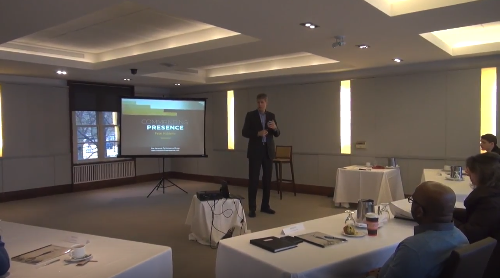Many of us have worked hard to land the leadership positions that we currently hold. But how do you keep advancing your career? One of the most accessible and, many would argue, enjoyable ways to advance your career is by developing your presentation skills.
 Why is it so important to deliver high-impact presentations?
Why is it so important to deliver high-impact presentations?
—
You have the knowledge, you have the experience and maybe you have the passion. These are all very important. Yet, at a certain point in your career, it’s your ability to express your knowledge, experience and passion that makes all the difference. Professional meetings and presentations are precious opportunities to work with people from other segments of your organization, to interact with those in senior leadership roles and to enhance your visibility and reputation as an expert in your field.
How do you work the audience during your presentation?
—
The answer: recognize their audience “type” to interact effectively and make your delivery a rewarding experience for all.
There are three groups in your audience: Learners, Vacationers and Hostages.
- Learners
 This is the group that you want to see in your audience. In fact, you may have planned your presentation specifically for them. Of the three groups, they are the most enthusiastic. They are eager to hear what you have to say and are willing to participate.
This is the group that you want to see in your audience. In fact, you may have planned your presentation specifically for them. Of the three groups, they are the most enthusiastic. They are eager to hear what you have to say and are willing to participate.
Learners are the most challenging group. They have done their homework; they expect everything on the agenda to be covered. Stimulate their curiosity with questions, options and problems. Make sure you “stick to the script” and start and finish on time.
Best of all, learners are most likely to reciprocate enthusiastically after a successful session by recommending your presentation and your organization.
- Vacationers
 This group of guests come out of curiosity, perhaps to network, or, though less likely, because they have nothing better to do and a free breakfast or lunch seems like a good idea. Like the learners, vacationers include potential clients.
This group of guests come out of curiosity, perhaps to network, or, though less likely, because they have nothing better to do and a free breakfast or lunch seems like a good idea. Like the learners, vacationers include potential clients.
Be careful of the vacationers; they can become disruptive if not acknowledged. Make sure that your presentations are interactive and that each part of your presentation is sprinkled liberally with compelling questions and interesting problems, rather than just facts and data, which only the learners may be willing to explore. If you continuously strive to engage them, you may convert a few vacationers to learners.
- Hostages
 There are hostages at every presentation – people who were assigned or asked to attend. Hostages have better things to do than to listen to your talk. Because they do not feel that they need to be there, they may not feel any obligation to participate.
There are hostages at every presentation – people who were assigned or asked to attend. Hostages have better things to do than to listen to your talk. Because they do not feel that they need to be there, they may not feel any obligation to participate.
Through no fault of their own, these individuals are obliged to sit through your presentation while trying to resign themselves to the fact that they have lost several hours of a working day. In your opening remarks, acknowledge the fact that there are some people in the group there out of an obligation of some sort. You could mention that you personally hate being torn away from your agenda and consequently sympathize with them. It is remarkable how often this causes laughter and creates a much friendlier environment.
Assure the hostages that your presentation will be brief, acknowledge their expertise and respectfully suggest that you may have some new information that may be of interest to them. Don’t overdo this however; the learners don’t appreciate time wasting!
How do you keep the entire audience engaged?
—
 There are strategies to keep and regain people’s attention during a presentation. If someone isn’t paying attention, just walk in their general direction and as you get closer, chances are they will begin to listen. If you are making sincere eye contact with someone in the audience, no one is aware that you’re even moving. You keep people’s attention by moving around enough that you are re-engaging them all the time, but be weary of pacing up and down, as this has the reverse effect. Make contact with someone, address a few comments to them, and then find someone else from this new position and talk to the rest of the audience from there.
There are strategies to keep and regain people’s attention during a presentation. If someone isn’t paying attention, just walk in their general direction and as you get closer, chances are they will begin to listen. If you are making sincere eye contact with someone in the audience, no one is aware that you’re even moving. You keep people’s attention by moving around enough that you are re-engaging them all the time, but be weary of pacing up and down, as this has the reverse effect. Make contact with someone, address a few comments to them, and then find someone else from this new position and talk to the rest of the audience from there.
With an interactive style that uses a touch of humour and compelling questions, you may succeed in calling a ‘truce’ with the hostages, and spark the vacationers’ curiosity, making them feel intellectually rewarded too. Most of all, you emerge from this process a more experienced and skilled speaker, bringing you a significant step closer toward your career goals.
Interested in improving your presentation skills?
—
Programs hosted by OSPE’s professional development partner, Commanding Presence, are designed to help you develop your communication skills to become a master speaker.
Upcoming Two-Day Workshop Dates in Toronto
—
OSPE members are invited to register for our upcoming Small Group Workshops. Limited to 10 participants per session.
- August 27-28, 2018
- September 24-25, 2018*
- October 29-30, 2018*
- November 26-27, 2018*
- December 17-18, 2018*
*Stay tuned for registration links on OSPE’s Course Calendar.
Two-Day Workshop Brochure with Agenda & Outline.
The following guest post has been contributed by Commanding Presence – an internationally acclaimed communication and presentation skills training organization, providing impactful training for executives. Participants will increase their ability to think on their feet, speak eloquently under pressure, reduce their speaking anxiety and communicate effectively. One of the main takeaways from this training is that both introverts and extroverts will learn to “say less, and say it better.” Participants learn to take complex thoughts and ideas and quickly and effectively deliver them in a manner that is designed to be heard, remembered and persuasive.





Leave a Comment